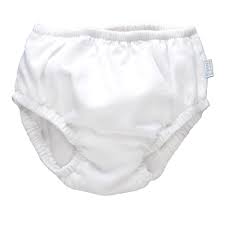diaper
英 [ˈdaɪ.pər]
美 [ˈdaɪ.pɚ]
- n. 尿布
- vt. 给孩子换尿布
- n. (Diaper)人名;(英)迪亚珀
使用频率:

记忆方法
将“diaper”与“dieper”(更深)的谐音联系起来,可以想象一张尿布掉入更深的水中,这样的画面可以帮助记忆“diaper”这个词的含义,即尿布。
以上内容由AI生成, 仅供参考和借鉴
中文词源
diaper 尿布
来自希腊语diaspros, 白色的,dia-, 穿过,-aspros, 白色。原指一种半透明的织物材料,后用来指尿布。
英语词源
- diaper
-
diaper: [14] The notion underlying diaper is of extreme whiteness. It comes ultimately from Byzantine Greek díaspros, which was a compound formed from the intensive prefix diaand áspros ‘white’. (Aspros itself has an involved history: it started life as Latin asper ‘rough’ – source of English asperity – which was applied particularly to bas-relief on carvings and coins; it was borrowed into Byzantine Greek and used as a noun to designate silver coins, and their brightness and shininess led to its reconversion into an adjective, meaning ‘white’.) Díaspros appears originally to have been applied to ecclesiastical vestments, and subsequently to any shiny fabric.
When the word first entered English, via medieval Latin diasprum and Old French diapre, it referred to a rather rich silk fabric embellished with gold thread, but by the 16th century it was being used for less glamorous textiles, of white linen, with a small diamond-shaped pattern. The specific application to a piece of such cloth used as a baby’s nappy (still current in American English) seems to have developed in the 16th century.
=> asperity - diaper (n.)
- mid-14c., "fabric with a repeated pattern of figures," from Old French diaspre "ornamental cloth; flowered, patterned silk cloth," perhaps via Medieval Latin diasprum from Medieval Greek diaspros "thoroughly white," or perhaps "white interspersed with other colors," from dia- (see dia-) + aspros "white."
Aspros originally meant "rough," and was applied to the raised parts of coins (among other things), and thus was used in Byzantine Greek to mean "silver coin," from which the bright, shiny qualities made it an adjective for whiteness. Modern sense of "underpants for babies" is continuous since 1837, but such usage has been traced back to 1590s. - diaper (v.)
- late 14c., "to put a small, repeated pattern on," from Old French diaprer, variant of diasprer, from diaspre (see diaper (n.)). Meaning "to put a diaper on" (a baby) is attested by 1951. Related: Diapered; diapering.
权威例句
- 1. To the British, however, he word " napkin " or " nappy " actually means " diaper. "
- 然而在英国人的词汇中, “napkin(餐巾) ” 或写作 “ nappy ”这个词实际意义为 “ 尿布(diaper) ”.
- 2. Cloth diaper may be folded in a triangle or a rectangle.
- 用布做的尿布可以叠成三角形或长方形.
- 3. Now I can help diaper him.
- 我现在可以帮他换尿布了.
- 4. Place the diaper under the infant's buttocks and fold sides in, between his legs.
- 将尿布置于婴儿的臀下, 在两腿之间将两边摺进去.
- 5. The Gross National Product were seen as a hadgepodge of Buicks, chickens, shirts, and diaper services.
- 把国民生产总值看成是比克脾汽车, 小鸡, 衬衫和织补服务等的大杂烩.
